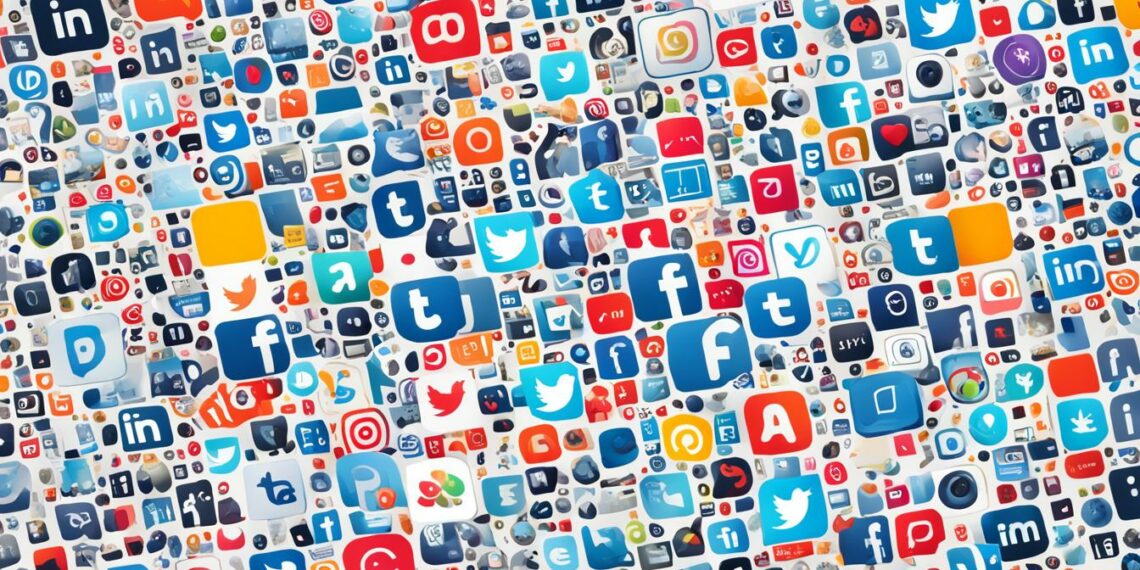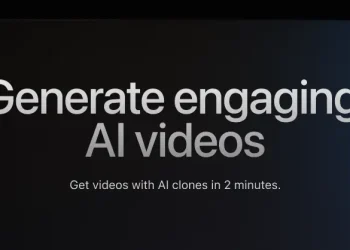Did you know that 97% of business leaders in the 2023 State of Social Media Report agree on one key point? AI is changing how companies use social media data and insights. In today’s world, AI for social media analytics is crucial for a winning marketing strategy.
Social media platforms are growing fast. Using AI to analyze user data, predict behaviors, and automate tasks can greatly improve your marketing. AI helps bridge the gap between businesses and their audiences. This leads to better engagement and performance.
New tools are coming out that make social media easier to manage. They help with everything from making content to understanding your audience. By using these tools, brands can spot trends, customize their messages, and stay ahead in a fast-changing market.
Key Takeaways
- AI significantly improves social media strategy through enhanced analytics.
- 97% of business leaders agree AI optimizes social media insights.
- Automation of tasks leads to better resource management for marketers.
- AI tools help uncover trends and patterns based on audience behavior.
- Businesses can achieve significant engagement boosts with targeted strategies.
Understanding the Impact of AI on Social Media Marketing
AI technology is changing social media marketing fast. The market for AI in social media is expected to hit $2.2 billion by 2023, growing at a rate of 28.3% annually. Marketers must use AI to stay ahead and make their strategies work better.
AI has made social media analytics much better. For example, Facebook Messenger uses AI chatbots to help customers and keep users interested. This helps brands connect with people better, making their efforts more successful.
Twitter uses AI to understand public opinion and trends in real time. This lets brands change their plans quickly. Facebook also uses AI to send ads to users based on their behavior, making ads more effective.
AI is also used for automating tasks on social media. Instagram uses AI to keep its platform safe by removing bad content. This lets brands focus on building their communities safely.
AI helps in influencer marketing too. Platforms like AspireIQ connect brands with influencers who match their audience. This ensures campaigns reach the right people, making partnerships more effective. As AI gets better, businesses find new ways to improve their marketing and give users content they like.
What is AI for Social Media Analytics?
AI for social media analytics uses advanced analytics technology to handle big data from different platforms. Platforms like Facebook, Instagram, LinkedIn, and Snapchat use AI to make content more engaging. This tech decides what content you see and how you interact with it, affecting how much you engage.
Social media tools like natural language processing and machine learning help AI do many tasks automatically. This saves time and money and lets marketers focus on strategy. AI can understand post performance, create content on its own, and figure out the best times to post to get more engagement.
AI has changed social media analytics from just tracking numbers to giving deep insights. Old analytics looked at likes and follows, but now, tools give detailed insights for better decisions. AI helps marketers make targeted messages, customize campaigns, and use trends early.
Data-driven posts make social media strategies work better. AI predicts which content will be popular, keeps an eye on brand mentions, and checks how people feel about a brand. These features help businesses know their customers better, making marketing more effective.
| Functionality | AI Impact |
|---|---|
| Content Moderation | AI controls comments and what you see |
| Task Automation | Reduces time and cost in social media management |
| Data Insights | Finds patterns and trends for better strategy |
| Audience Targeting | Makes detailed profiles for better messaging |
| Trend Prediction | Forecasts which content will go viral and engage users |
AI for social media analytics is key for keeping up with online conversations. As companies use AI more, making quick, data-driven decisions becomes a big advantage.
Benefits of Incorporating AI in Your Social Media Strategy
Using AI in social media can really boost your brand and connect better with your audience. AI tools help make creating content quicker and cheaper. In 2023, AI is big because it lets you personalize content for different people, which is key to reaching out to more users.
AI makes things more efficient by automating boring tasks and analyzing data accurately. For example, AI chatbots can answer customer questions 24/7, making customers happier. This means businesses can talk to customers all the time, which is great.
AI also helps with targeting your audience better. It looks at user data and behaviors to find the best groups for your ads. This way, brands can make content that really speaks to people, drawing them in.
Sites like Instagram use AI to show users content they’ll like, making their experience better. AI also helps brands understand what people think by analyzing feelings in posts. This gives brands deep insights into what the public thinks.
AI makes social media strategies more efficient and cheaper. A smart AI for social media strategy can lead to more engagement and loyal customers. For more tips on using AI in social media, check out this useful guide.
How AI Enhances Content Creation and Scheduling
In today’s fast-paced social media world, content creation and scheduling are key to marketing success. AI tools change the game by making these tasks easier. This lets brands stay active on many platforms.
For example, Sprinklr cut content creation costs by up to 50%. This means teams can spend more time on important tasks. The Washington Post uses AI to automate parts of news articles. This lets reporters focus on deeper stories.
Big names like Netflix and Spotify use AI to make user experiences better. Netflix uses machine learning to make content suggestions that bring in new viewers. Spotify’s AI makes playlists for users, keeping them engaged and reducing the chance they’ll leave.
AI also helps with scheduling. Companies can plan their social media better, manage posts, and come up with new ideas. About 64% of companies say AI makes them more productive.
Canva offers AI-driven templates for social media graphics. Lumen5 uses AI to turn text into videos, grabbing audience attention. As companies grow, AI’s ability to handle more content is crucial.
To sum up, AI tools make content creation better and scheduling more efficient. This combo boosts brand visibility and connects with audiences on social media.
AI for Social Media Analytics: Sentiment Analysis and Data Insights
Sentiment analysis is key in social media analytics. It helps brands understand how people feel about them. By using advanced tools, marketers can get deep insights into what their audience likes and dislikes. This info is crucial for making marketing plans.
Leveraging Natural Language Processing for Audience Understanding
Natural language processing is vital for understanding what people think. It looks at social media posts to sort out what people say about a brand. This way, businesses get a clear picture of how their customers feel.
Tools like Qualtrics use smart algorithms to make sense of this data. This helps them give clear insights that brands can use.
Utilizing Sentiment Analysis for Real-time Feedback
Real-time sentiment analysis lets brands adjust their marketing on the fly. They can see how people react right away, whether it’s good or bad. For instance, Rihanna got over 10,000 positive comments in a month, with 81.7% of them being positive.
This info helps brands keep a good reputation and manage customer relationships well.
| Emotion | Percentage of Mentions |
|---|---|
| Admiration | 45% |
| Joy | 30% |
| Fear | 10% |
| Sadness | 5% |
| Anger | 7% |
| Disgust | 3% |
AI tools like OpenText’s Magellan give clear insights on trends and what people think. They work faster than old methods. This lets brands stay ahead and make smart choices quickly.
Optimizing Audience Segmentation with AI
In the world of digital marketing, getting your audience right is key. AI has changed how companies understand and connect with their customers. It helps make audience segmentation more precise. By using advanced algorithms and machine learning, businesses can make detailed profiles that show the variety in their audience.
Creating Detailed Audience Profiles
Having detailed profiles of your audience helps marketers make their campaigns hit the mark. AI helps by using different ways to segment your audience:
- Behavioral Segmentation: Tracks how people interact on the web, what they leave in their carts, and what they buy.
- Demographic Segmentation: Groups people by age, job, marital status, income, and education.
- Geographic Segmentation: Looks at where people live, what language they speak, and how they get around.
- Needs-based Segmentation: Sorts customers by what they want in a product, how they like to be helped, and where they want their items delivered.
- Psychographic Segmentation: Focuses on what people value, believe in, and are interested in.
- Technographic Segmentation: Tracks the devices and browsers people use, where they come from, and their social media habits.
These methods help marketers really get to know their customers. AI is key in making this easier by automating the process, ensuring it’s accurate, and saving time.
Predicting Consumer Behaviors and Preferences
AI tools are great at predicting what customers will do next. They look at past data and current trends to guess what customers will want in the future. The benefits of AI here are huge:
- Anticipation of Audience Needs: Marketers can be proactive, sending out messages and offers that really speak to people.
- Enhanced Personalization: AI gets what people like, making campaigns super targeted.
- Dynamic Segmentation: This flexibility lets marketers quickly adjust their plans based on new data.
- Improvement of ROI: Better campaigns lead to better results by reaching people who are really interested.
Using AI for audience segmentation is a smart move for brands. It lets them make a bigger impact with their marketing. By combining predictive models with detailed profiles, businesses can really engage with their audience and boost their sales.

The Role of AI in Influencer Marketing
AI has changed the game in influencer marketing. Brands like Pulse Advertising have used AI since 2019. This has led to big changes in how they work and what they create. AI helps marketers understand audiences better, find influencers that fit their goals, and get insights into consumer behavior.
Using AI in influencer marketing lets brands make changes fast. Before, making changes took weeks, which could be too late. Now, AI lets brands update campaigns quickly, keeping them fresh and interesting.
When using AI for brand partnerships, being ethical is key. Marketers must follow the rules and be open about how they use AI. This honesty helps build trust with people and connects brands with consumers in a real way.
AI gives brands powerful tools for predicting how campaigns will do. It helps create content that speaks to the right people. Plus, AI makes complex data easy to understand, showing how well influencer campaigns work.
But, influencer marketing still has its challenges. Finding the right balance between using AI and staying true to the brand is hard. But AI helps focus on specific customers, making campaigns more effective and personal. This leads to better engagement and more sales.
| AI Application | Impact |
|---|---|
| Real-time Adjustments | Speeds up campaign optimization, enhancing responsiveness to trends. |
| Predictive Analytics | Provides insights for strategic refinement before campaign launch. |
| Content Creation | Generates tailored content, improving engagement and performance. |
| Ethical Compliance | Ensures adherence to regulations and builds trust with audiences. |
| Performance Measurement | Tracks campaign effectiveness against sales data for clear ROI insights. |
Brand Monitoring and Competitive Analysis through AI
In today’s fast-paced social media world, brand monitoring and competitive analysis are key for businesses to lead. With AI tools, marketers can track brand mentions on platforms like Facebook, Twitter, and Instagram. This tech gives real-time insights into what customers are saying and what trends are out there. It helps with better engagement and handling crises.
AI-driven tools for social media offer many benefits. They use sentiment analysis and natural language processing to make responses timely and relevant. Users can filter data and customize dashboards to get actionable insights easily.

Competitor analysis is very important. It helps companies stay on top of market changes. Tools like Kompyte and Crayon provide updates on competitors in one place. Using AI tools in brand monitoring helps spot opportunities and risks fast.
But, there are challenges like privacy concerns and the accuracy of sentiment analysis. As we move forward, more automation and predictive analytics will be crucial. They will help improve brand monitoring and competitive analysis.
For a deeper look at how AI can boost marketing strategies, check this informative article.
Data-Driven Marketing: Making Informed Decisions
Data-driven marketing is key to making smart choices in business. It uses advanced analytics and AI to turn complex data into useful insights. This helps marketers check how campaigns are doing, make content that people like, and improve marketing for better results and ROI.
Utilizing AI Tools for Enhanced Analytics
AI tools give marketers deep insights into social media metrics. These metrics, like engagement rates, reach, and conversion rates, show how well content is doing:
| Metric | Description | Importance |
|---|---|---|
| Engagement Rate | Measures interaction levels through likes, comments, and shares. | Indicates content quality and relevance. |
| Reach | Counts unique users who viewed the content. | Helps understand brand awareness impact. |
| Click-Through Rates | Tracks user clicks on links or calls-to-action. | Shows effectiveness in driving traffic. |
| Conversions | Captures user actions like purchases. | Links social media efforts to business goals. |
Using a data-driven marketing approach helps teams make better content strategies. They can find the best times to post for more visibility and engagement. This is key for successful marketing campaigns. Tracking and analyzing data also helps keep an eye on ROI, making sure marketing budgets work well.
To learn more about improving your marketing with data-driven methods, check out this helpful resource. By using advanced analytics and AI, marketers can focus on what the audience likes. This leads to marketing that really connects with people and gets results.
The Future of AI in Social Media Marketing
Social media marketing is changing fast. AI is bringing new tools that will change how we market. By 2023, the AI in social media market will hit $2.2 billion. It will grow by 28.77% each year for the next five years. This shows a big change in how brands connect with customers and use data.
AI is changing how we make content. For example, AI tools can make great content much faster than humans. Companies like MacPaw are using these tools and seeing big gains in efficiency. As more companies use these tools, social media marketing will focus more on automation and making experiences personal.
Using data to make decisions is key as companies invest in AI. About 40% of companies are using AI for marketing tasks like making content and analyzing data. This use saves time and resources and makes marketing messages more targeted and effective. AI helps brands understand what users like and how they behave for better engagement.
AI chatbots are also changing how we talk to customers. These systems let businesses answer questions all the time, making customers happier. Using these technologies makes customer experiences smoother and helps brands connect better with their audience.
As AI gets better, new tools like facial recognition will help improve how we interact on social media. The future of AI in social media marketing looks bright. It will bring more personalized offers and insights that will make marketing more effective.
| Year | Market Size (in Billion $) | CAGR (%) |
|---|---|---|
| 2023 | 2.2 | 28.77 |
| 2026 | 3.71 | 28.77 |
| 2023 (AI-for-social-media industry) | 2.1 | N/A |
Conclusion
As we conclude our look at AI for social media analytics, it’s clear AI boosts marketing strategies a lot. AI quickly goes through a lot of data to find important insights. This helps brands understand what customers feel in real-time, letting them respond better and change their plans.
AI also predicts trends and what users like by looking at past data. This helps in making better content and finding the right customers by spotting small patterns in their actions. Using AI for social media analytics puts businesses ahead in a fast-changing world.
The future of AI in social media analytics looks bright, with more predictive powers and better automation in managing tasks. Companies that use these new tools will make smarter choices and stand out in marketing. It’s an exciting time for those who see the value of using data to shape digital marketing’s future.
FAQ
What is AI for social media analytics?
AI for social media analytics uses advanced algorithms and technologies like natural language processing and machine learning. It helps marketers understand how people interact with their content. This leads to better content creation and strategy optimization.
How does AI improve audience segmentation?
AI helps make audience segmentation better by looking at user interactions and preferences. This creates detailed profiles of audiences. Marketers can then tailor their campaigns better and predict consumer behavior.
What are the benefits of incorporating AI into social media marketing?
Using AI in social media marketing has many benefits. It makes creating content more efficient and targets audiences better. It also improves analytics, automates tasks, and helps analyze big datasets for trends. This leads to better engagement and performance.
How can AI assist in influencer marketing?
AI tools help find the right influencers by looking at audience alignment and engagement. This way, brands can partner with influencers who match their target audience. This leads to more meaningful engagement and results.
What role does sentiment analysis play in AI for social media analytics?
Sentiment analysis uses natural language processing to understand audience emotions and preferences in real time. It lets businesses adjust their marketing based on immediate feedback. This improves their connection with customers.
How does AI facilitate content creation and scheduling?
AI tools can come up with content ideas, write posts, and schedule them automatically across different platforms. Tools like FeedHive and Buffer keep content flowing consistently. They also help find the best times to publish and engage with the audience.
Why is brand monitoring important in social media marketing?
Brand monitoring is key because it lets marketers keep track of brand mentions and analyze competitors. AI tools help analyze market trends constantly. This helps brands stay competitive and adapt quickly to changes.
How does AI support data-driven marketing?
AI helps data-driven marketing by finding actionable insights in complex data. Marketers can look at campaign performance and audience needs to improve their strategies. This leads to better decision-making and higher ROI.
What future trends can we expect with the integration of AI in social media marketing?
The future of AI in social media marketing will focus on more personalization, better customer service, and advanced analytics. As brands use these technologies, we’ll see more data-driven insights. This will improve engagement and strategy effectiveness.




